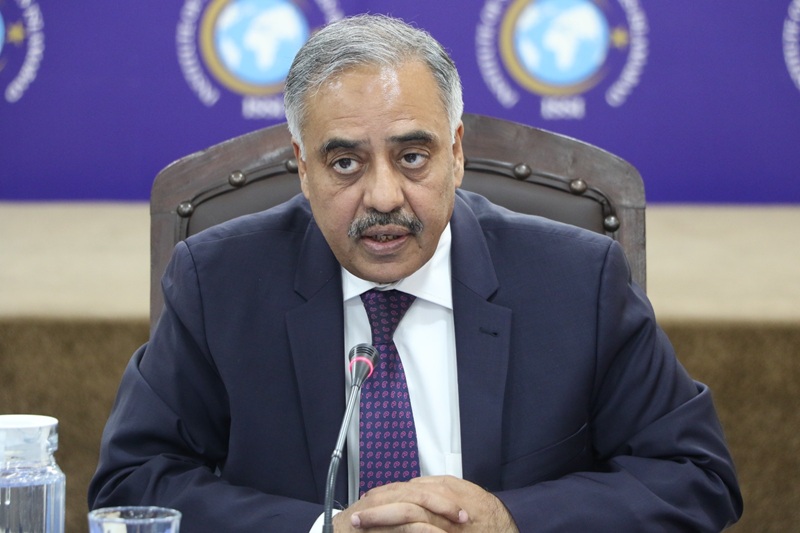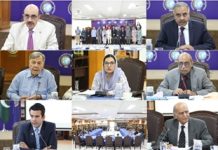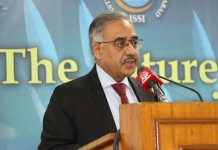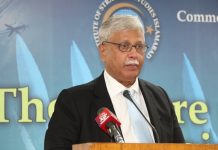Remarks by Director General ISSI Ambassador Sohail Mahmood at the ISSI-CLAS Joint Seminar on: “Weaponizing Water: The Indus Waters Treaty and Future of Regional”, ISSI, 18 June 2025

Let me begin by warmly welcoming everyone to the ISSI for the seminar on “Weaponizing Water: The Indus Waters Treaty and the Future of Regional Stability.” We are delighted to collaborate with the Centre for Law and Security (CLAS) at TMUC in organizing this important event. CLAS is a valuable partner and the ISSI looks forward to holding a series of similar joint activities to promote our shared goals of assisting the research and policy process on key issues.
The seminar brings together leading voices in hydrology, diplomacy, environmental policy, and international law to examine the legal, strategic, humanitarian, and ecological ramifications of the recent Indian announcement of putting the Indus Waters Treaty (IWT) “in abeyance.” Through expert analysis and informed dialogue, we aim to explore the far-reaching consequences of the Treaty’s potential dysfunction and the dangers this poses to regional peace and cooperation.
I extend special welcome to Ambassador Shafqat Kakakhel, Secretary Ashfaq Mahmood, Dr. Bushra Bibi, and Mr. Rehman Azhar. We look forward to their insightful contributions. We are also especially privileged to have Sardar Masood Khan gracing this occasion. Given his vast experience, astute diplomatic skills, and profound wisdom, his perspective on this issue of immense national importance would be highly illuminating.
Distinguished participants,
India’s unilateral and illegal action is a serious threat to regional peace, environmental stability, and human security. This reflects a broader crisis in South Asia as India is systematically attempting to choke Pakistan’s water, which is a vital lifeline.
For over six decades, the Indus Waters Treaty of 1960 stood as a rare success story of conflict resolution. It is an embodiment of rational diplomacy amid regional animosity, and a mutual recognition of rights and responsibilities. It is the fruit of nine years of exhaustive negotiations, and a Treaty that survived wars of the 1960s and the 1970s, standoffs of the early 21st century, and even India’s aggressive cross-LoC and cross-border actions under the incumbent BJP regime.
In April 2025, in the wake of the Pahalgam incident in IIOJK, India crossed a dangerous redline by announcing its latest measure against IWT. In doing so, it has turned water, the source of an estimated 90% of Pakistan’s food production, into a weapon of war.
India’s blockage of water and construction of several dams over the years — including Kishanganga, Ratle, Baglihar, and Pakal Dul — has not only violated the Treaty terms but also destroyed ecosystems and endangered the lives of millions. The eastern rivers — Sutlej, Beas, and Ravi — run dry. What once fed Pakistan’s breadbasket now only feeds parched soil and broken communities. This is not a narrative, rather this is the stark reality shaping up in South Asia.
It is important to put the Indian action on IWT in the broader context of the BJP-RSS outlook towards Pakistan. At its core, it is driven by the Hindutva ideology — which in its internal dimension envisions the establishment of a Hindu Rashtra in India; and, in its external dimension, aspires to create Akhand Bharat. These strands have far-reaching consequences for the Indian polity and society on the one hand, and for regional peace and stability on the other hand.
For 11 years now, the BJP regime has followed what it terms as a “muscular” policy vis-à-vis Pakistan. The major feature of this approach is the pan-securitization of the India-Pakistan relationship. It is manifested in frequent resort to coercive and kinetic measures and weaponisation of trade, water, sports, people-to-people exchanges, and the narrative of alleged ‘cross-border terrorism.’ The overall result has been a systematic, brick-by-brick dismantling of Pakistan-India dialogue platforms, the painstakingly built legal frameworks, and the myriad tracks of cooperation at the bilateral and regional levels.
Despite the fact that neither the repeated resort to force, nor the so-called ‘muscular’ approach, have helped India achieve any of its stated geopolitical goals, it is inexplicable that New Delhi continues to obstinately persist with this misguided, deeply-flawed, and counter-productive policy. The need on India’s part for a sober reflection on this posture, especially after the recent 4-day India-Pakistan war, cannot be over-emphasized.
Pakistan’s strategy to counter India’s attempts to undermine the Indus Waters Treaty should be anchored in a comprehensive evaluation of the Treaty’s working over the past 6 decades, the possibilities of addressing contemporary challenges such as climate change, and a careful consideration of expert assessments and stakeholder recommendations.
First and foremost, Pakistan’s response must remain anchored in every instrument of international law and diplomacy. All avenues available in the Treaty’s provisions as well as international law and transboundary water management must be fully explored and appropriately employed.
In the diplomatic domain, Pakistan has already highlighted the illegal and unilateral nature of India’s action. This campaign to raise global awareness and to highlight the consequences of New Delhi’s approach must remain proactive and sustained. From the various platform in the United Nations including the General Assembly, Security Council, ECOSOC, UNEP, and Human Rights Council, to OIC and other relevant international fora, this matter must be taken up with a view to mobilizing the international community. The World Bank, which has had pivotal role in the negotiation of the Treaty and its dispute resolution mechanism, should be closely engaged.
Pakistan must also mobilize water-stressed nations around the world. This will be to set a precedent that rivers cannot be turned into instruments of coercion and subjugation. If water can be weaponized in South Asia today, it can be used as a weapon elsewhere tomorrow—in the Sahel, in Central Asia, and in Latin America. What begins as one region’s nightmare can become the world’s norm. And we must safeguard against this eventuality.
Since the issue has wider regional ramifications, Pakistan should also engage China and other South Asian states that have trans-boundary rivers with India.
Pakistan should also see the opportunity in this crisis and focus attention on water governance within. The National Water Policy of 2018 is a valuable framework to improve water management and ensure sustainable water security.
Distinguished participants,
Water is not a bargaining chip. It is a matter of life and peace in South Asia. Pakistan’s patience is not be misunderstood as weakness. Pakistan has already made it clear at the highest level that if water flow is diverted, this would be considered as an ‘act of war.’
This should not be construed as a threat, but a statement of resolve to give a befitting response if India ever decides to interrupt water flow. India cannot hold 240 million lives hostage to its hyrdo-terrorism.
By hosting this important discussion, ISSI and CLAS reaffirm their commitment to advancing Pakistan’s strategic thinking on water diplomacy and emphasize the urgent need to safeguard transboundary water-sharing frameworks.
We hope this seminar contributes meaningfully to the development of a cohesive national response and promotes the responsible stewardship of shared water resources to prevent their use as instruments of coercion.
Thank you.














